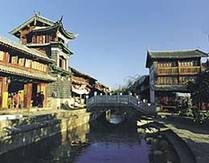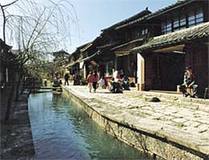At the foot of Yulong Snow Mountain in northwestern Yunnan Province is the ancient town of Lijiang. In the remote past, it was already inhabited with tribal people. In 1253, Kublai Khan, the Mongol chief, stationed his troops here on his southward march to conquer the State of Dali. For the next 500 years, to the early days of the Qing Dynasty, the place was ruled by a hereditary succession of chieftains from the Mu clan of the Naxi people, under the jurisdiction of the imperial court.
The town, screened by a mountain and facing a river, has no high walls. It is crisscrossed with ancient streets and lanes paved with colored stones and lined with residential houses of wood-stone-mud structure characterized by pretty, simple and practical styles. Small streams run parallel with Sifang Street in the center of the town and many other lanes. Green trees shade the houses and lanes. Willow tree branches hang low to caress the water in the streams. Residential houses either stand against a stream or have in the front small bridges across streams. In some cases, a stream runs right underneath houses.
Classical Naxi music is described as the "living musical fossil" because of its long history. More surprisingly, the Dongba script is the world's only living hieroglyphics still in use. More than 20,000 volumes of ancient books in Dongba writing, rare and valuable documents, are now collected by libraries in China as well as some European and American countries.
Lijiang was placed on the world cultural heritage list in 1997.



Lijiang Municipal Tourism Administration
Tel: 86-888-5123432